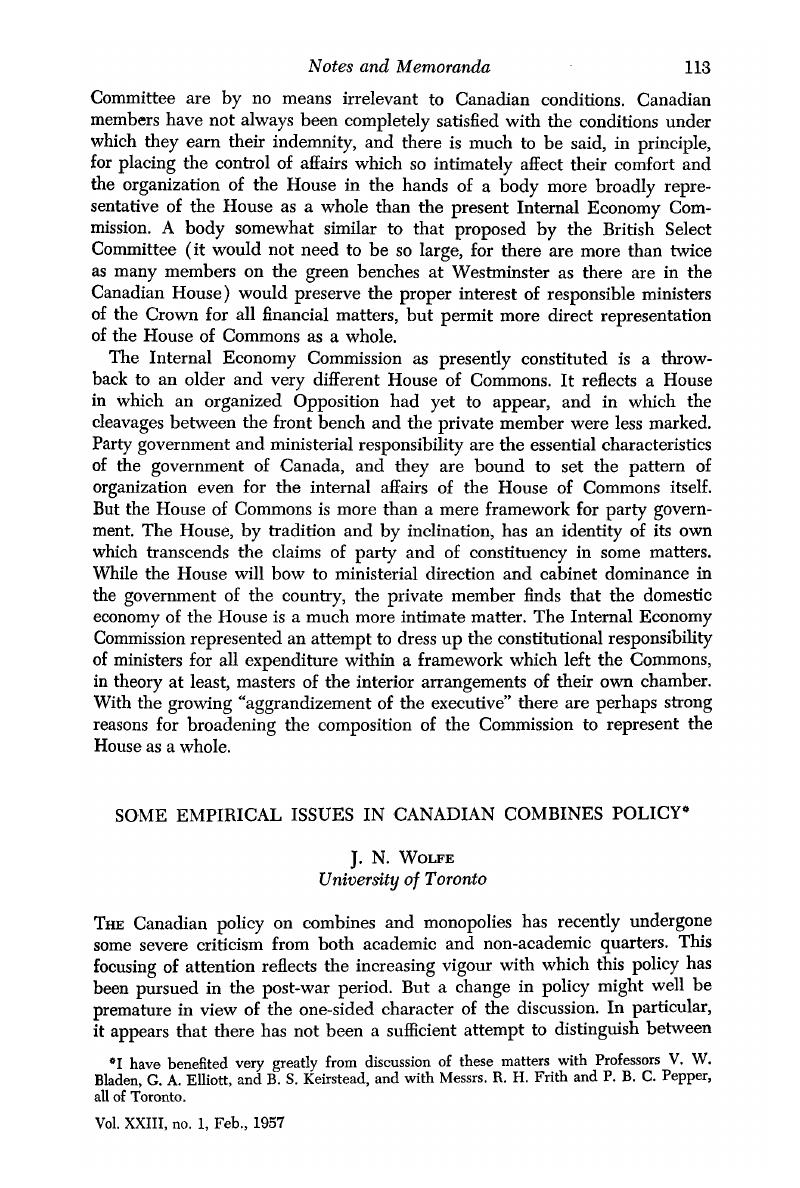No CrossRef data available.
Published online by Cambridge University Press: 07 November 2014

I have benefited very greatly from discussion of these matters with Professors V. W. Bladen, G. A. Elliott, and B. S. Keirstead, and with Messrs. R. H. Frith and P. B. C. Pepper, all of Toronto.
1 For examples of such confusion see in particular Friedmann, W., “Monopoly, Reasonableness, and Public Interest in the Canadian Anti-Combines Law,” Canadian Bar Review, 02, 1955, 133–63.Google Scholar For brevity, and because the material is already widely available, I have not included a summary of Canadian law and practice. See, however, the writings cited below, and also the papers by Bladen, V. W. and McGregor, F. A. in Chamberlin, E. H., ed., Monopoly and Competition and their Regulation (London, 1954).Google Scholar Most cases since the war have been under section 421(1)d of the Criminal Code. The recent report of the Restrictive Trade Practices Commission in the case of the Winnipeg coal dealers appears to mark the beginning of a more empirical approach to collusion.
2 They would at any rate consider this policy appropriate unless there were special reasons for thinking that important injustice would be done in individual cases by any general rule. For example, it is usual to argue that the custody of children in divorce cases is too important a matter to be left to rigid and inflexible legislation, but ought to be decided after full examination of the particular facts of the concrete situation. It is not, however, easy to see why this squeamish attitude is necessary in dealing with collusion. But cf. note 8 below.
3 See for example the submission of Professor V. W. Bladen to the Royal Commission on Canada's Economic Prospects. See also Bladen, V. W. and Stykolt, S., “Combines Policy and the Public Interest” in Friedmann, W., ed., Anti-Trust Law: A Comparative Symposium (Toronto, 1956).Google Scholar
4 On the advantages of the rule of law in economic affairs, see Simons, H. C., Economic Policy for a Free Society (Chicago, 1948), 107–21.Google Scholar
5 The advantages of the technique of injunction have been pointed out by Professor Bladen in his Introduction to Political Economy (Toronto, 1941), 188–247.Google Scholar
6 See Stykolt, S., “Combines Policy: An Economist's Evaluation,” this Journal, XXII, no. 1, 02, 1956, 38–45.Google Scholar
7 It has sometimes been argued that a law forbidding collusion is, in effect, an order to many firms to attempt the impossible, and is therefore unjust. This contention depends on the assertion that collusion is necessary when there are only a few producers of any particular product. I regard this opinion as both theoretically unsound, except in very special circumstances, and empirically unsupported. See my “Problem of Oligopoly,” Review of Economic Studies, XXI(3), no. 56, 06, 1954, 181–92.Google Scholar
8 Some writers have laid particular stress on their belief that the present administration of combines policy is contrary to the will of Parliament. This point may be important politically; but it is surely irrelevant in considering these matters from an economic or social point of view. What is important is not what Parliament did intend, but what Parliament ought to have intended! In any case, if Parliament had really intended that collusion should in future be handled in an empirical manner rather than by the rule of law, it is not clear why the criminal code was not amended at the same time as the act. And may it not be assumed that Parliament's apparent acceptance of the existing practice constitutes a tacit endorsement?
9 I should like to make it very clear that I am not suggesting that all monopolies are economically disadvantageous, or the reverse. In some monopolized industries, production by a large number of firms would involve substantially higher costs, and might even involve less rapid improvement in techniques and efficiency. On the other hand, it is not at all clear whether many of the industries at present under monopolistic control fall within that class. Finally, political, as well as economic, factors should determine our decision on whether a particular monopoly should or should not be tolerated.
10 For a defence of this position see note 8 above.
11 See Macgregor, D. H., Industrial Combination (London, 1938), 19–93.Google Scholar
12 The difficulties involved in drafting a satisfactory law against these practices must not be underestimated. I suspect, however, that they would be much less than those that would be met in attempting to sort harmful from harmless collusions by legal means.
13 The suggestion that collusion or monopoly, or both, can best be handled by tariff reductions, rather than by fines and imprisonment, seems to me rather unsophisticated. It is of course true that prevention is generally better than cure. It is also true that prevention of restrictive practices provides one of the strongest arguments for freer trade. But where a country has decided (no doubt on bad advice!) that a policy of industrial development is a desirable objective, it ought not, nor is it likely, to give up that aim in order to increase the effectiveness of anti-combines policy. That would certainly be burning down the house to roast the pig!